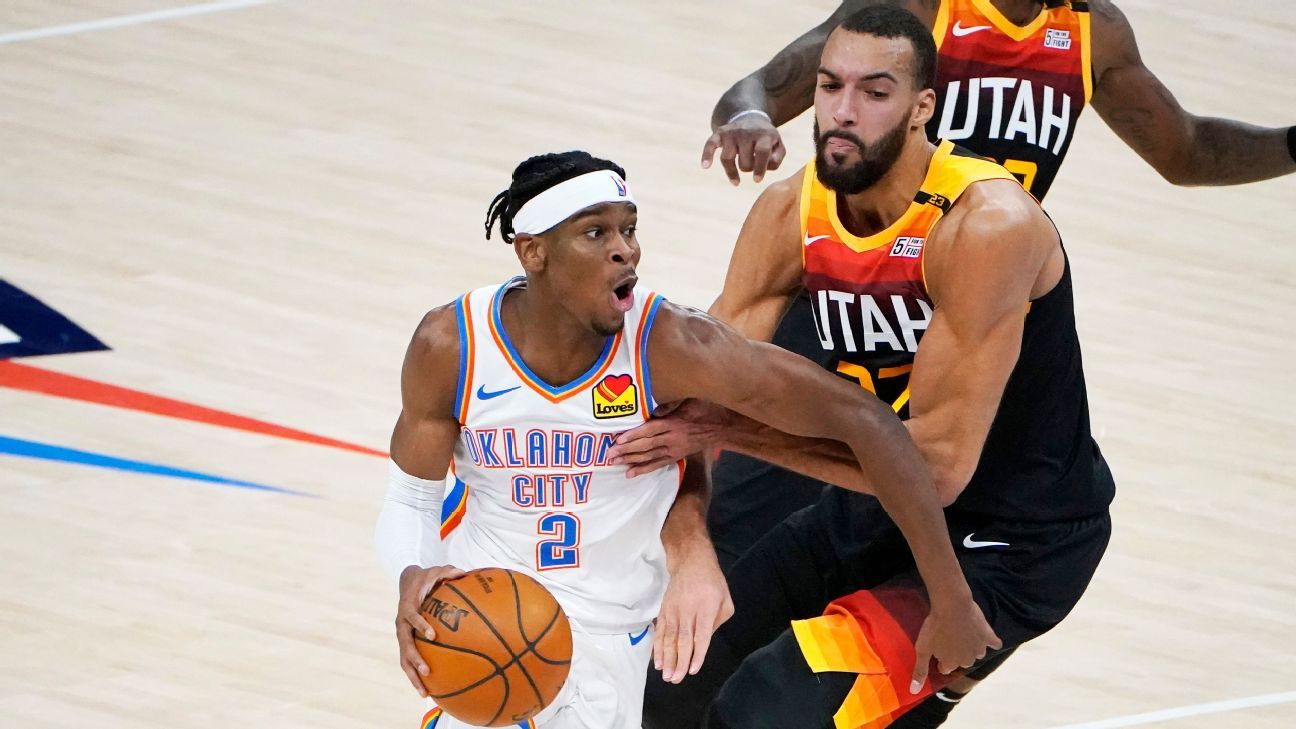Sometime around 4:30 p.m. local time Monday, Rudy Gobert walked out of the 21c Museum Hotel in the west end of downtown Oklahoma City and stepped onto a bus to make the seven-block trip over to Chesapeake Energy Arena.
Nine and a half months ago, Gobert walked out of that same hotel and stepped into a car to be taken about 20 blocks away to the University of Oklahoma Medical Center to be tested for COVID-19. It seemed preposterous Gobert might actually have the coronavirus, but after returning negative tests for strep and flu, he got a swab up his nose. Less than 24 hours later — only about 10 minutes before the Oklahoma City Thunder and Utah Jazz were scheduled to tip off on March 11 — he tested positive for the virus, kicking off a series of events that forever changed the NBA … and the sports world as a whole.
On Monday, Gobert made the long walk down the hallway to the locker room he never saw in March, the one his teammates spent hours confined in, with unknowns and fears circling them as they sat in a circle with blue surgical gloves and masks on, waiting for health officials to arrive to test them.
“I walked into my office and I remembered how I spent a little time in there,” Jazz coach Quin Snyder said Monday with a smile. “I won’t call it PTSD, because it’s not that extreme, but certainly there are memories.”
Monday’s game was a full-circle moment for Gobert and the Jazz, with the flood of memories unavoidable, though they didn’t want to make it a focus of the night. They didn’t spend too much time talking about it, Snyder said, but little things, such as being at the same hotel or seeing the locker room or walking onto a court with no fans, served as reminders.
“I had the same [hotel] room, believe it or not,” Donovan Mitchell said. “Which is ironic.”
The Jazz won the game 110-109, with Mitchell hitting a banked runner with seven seconds left to provide the final margin. The Thunder had a chance to win at the buzzer, with Shai Gilgeous-Alexander driving to his right, but he was met by the towering presence of Gobert and his albatross arms contesting the shot. Gilgeous-Alexander’s layup was short, Gobert grabbed the rebound and the buzzer sounded with the ball in his hands.
“It’s just basketball. I was just focused on trying to get the win,” Gobert said. “The one [big] thing was being back at the same hotel, all the memories. It was a little weird.”
Gobert’s life changed in March when he tested positive a few days after he touched reporters’ recorders on a table in front of him, making light of new protocols put in place by the league to separate players and media to protect against the spread of the virus. He became the NBA’s patient zero, with his carelessness an example. He accepted responsibility and apologized, then spent two weeks contending with the virus and dealing with strong symptoms, which included months without being able to taste or smell.
“Rudy was vilified, and in hindsight, we have a greater understanding of the virus,” Snyder said. “I think Rudy recognizes fully there were some mistakes made, and those mistakes were made over and over again by different people, all of us.
“In that moment, it was such a significant thing; and in Rudy’s case, he’s had a chance to process it. We always challenge ourselves when we have adversity, to make you better, and I think Rudy has come out of this in a place where there’s growth. Not just Rudy, but for all of us.”
Much has changed since March — people, places, things.
“It’s the same year. It’s still the same year from all of that,” Mitchell said. “It feels like it was forever ago, but I don’t think we thought about it too much. We had a moment where we got here and it was like, ‘All right, we’re back.'”
The game in March also was an inflection point for the Gobert-Mitchell relationship, with tensions rising over the transmission of the virus after Mitchell tested positive the following day. The entire chemistry of the Jazz locker room was in question, with many openly wondering if something would have to give. Would the Jazz trade one of their stars? Could they work it out?
Mitchell admitted it took him “a while to cool off,” and the two went an extended period of time without talking. When the NBA resumed in the Florida bubble, Gobert and Mitchell were forced to confront the issue and repair the fracture. They realigned with a common goal as the unifier: winning.
Monday’s game was fitting for a lot of reasons, but to have Mitchell hit the go-ahead shot and Gobert produce the winning stop showcased the formula the Jazz have built their hopes on. Snyder referenced the growth the team experienced from that night in March, but it runs deeper than winning a basketball game almost 10 months later.
“I think all of us have such a greater appreciation for what we consider to be a normal life,” the coach said. “You can’t help but remember that evening; it was significant for both teams, really for the league. But also, the contrast between that point and where we are now, the season, the hiatus, the bubble, coming back and playing again — it seems like a lifetime since that happened.”
